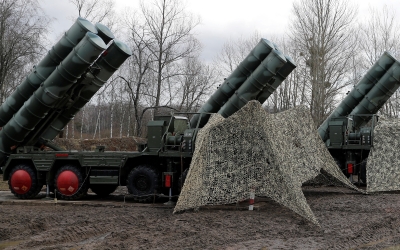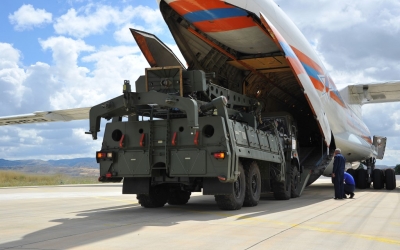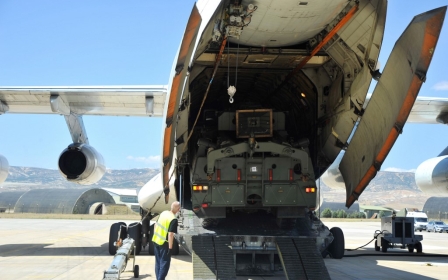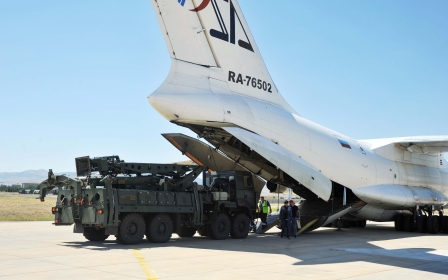US imposes sanctions against Turkey over Russian S-400 missile system
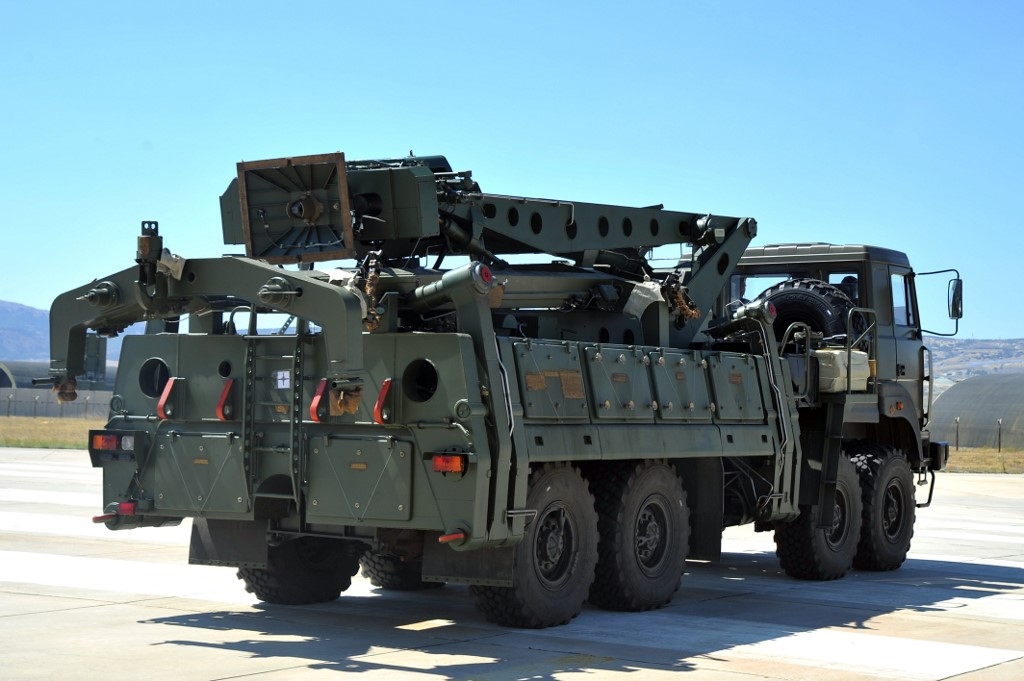
The US Treasury Department has levied sanctions against an agency within Turkey's Ministry of National Defence and its president over the country's acquisition and activation of a Russian-made missile defence system.
The Treasury on Monday said the long-awaited sanctions targeted Turkey's Presidency of Defence Industries (SSB), as well as its head, Ismail Demir, and three employees.
New MEE newsletter: Jerusalem Dispatch
Sign up to get the latest insights and analysis on Israel-Palestine, alongside Turkey Unpacked and other MEE newsletters
Previously known as the Undersecretariat for Defence Industries, in 2018 Turkish President Recep Tayyip Erdogan issued a presidential decree renaming the office and putting it under the presidency’s direct control.
The sanctions were imposed against the agency, its president and other SSB officers "for knowingly engaging in a significant transaction with Rosoboronexport, Russia’s main arms export entity, by procuring the S-400 surface-to-air missile system", Secretary of State Mike Pompeo said in a statement on Monday.
Turkey's Foreign Ministry condemned the sanctions as a "grave mistake" and urged Washington to revise its "unjust decision". It said sanctions would inevitably harm mutual relations and threatened unspecified retaliatory steps.
The dispute between the US and Turkey has been ongoing since it purchased the Russian S-400 missile defence system last year, with the US Congress insisting that Ankara be slapped with sanctions required under US law.
Because the S-400 defence system has the ability to "learn" flight patterns and other data about aircraft flying overhead, Washington views a Nato ally buying the Russian defence system as a security threat and had previously asked Ankara to pull out of the deal.
Turkey acquired the S-400 batteries from Russia last year despite warnings from the US and Nato that the purchase would see Ankara ejected from the US F-35 stealth fighter jet programme and potentially exposed to damaging sanctions.
Ankara said the Russian defence system would not be integrated into Nato systems and posed no threat, calling for a joint working group.
'Not something we take lightly'
In Monday's statement, Pompeo stressed the US "made clear to Turkey at the highest levels and on numerous occasions that its purchase of the S-400 system would endanger the security of U.S. military technology and personnel and provide substantial funds to Russia’s defense sector, as well as Russian access to the Turkish armed forces and defense industry".
"Turkey nevertheless decided to move ahead with the procurement and testing of the S-400, despite the availability of alternative, NATO-interoperable systems to meet its defense requirements".
US President Donald Trump has threatened sanctions for more than a year, stirring headlines in October 2019 over a letter sent to Turkish President Erdogan that read in part: "Let's work out a good deal!.... Don't be a tough guy! Don't be a fool!"
Still, his administration has been hesitant to follow through with the threat and has tried to sort out the issue diplomatically. Talks to rectify both parties' concerns fell into disarray when Turkey activated and began testing the missile system. The most recent tests took place in October.
In a phone briefing on Monday, US officials said Washington tried to sway Ankara away from buying Russia's S-400, including offering alternative air defence systems.
"We very much regret that this has been necessary," said Chris Ford, assistant secretary of state for international security and nonproliferation.
He added that the sanctions should send a warning to other countries around the world to "take note… that they should avoid further acquisitions of Russian equipment, especially those that could trigger sanctions".
Matthew Palmer, deputy assistant secretary in the Bureau of European and Eurasian Affairs, stressed that the sanctions do not aim to undermine Turkey's military capabilities. Rather, he said the law is "designed to impose costs on Russia" over its "malign" activity in the world.
"It's not something we take lightly," Palmer said. "We continue to value Turkey's contributions to Nato... However, its acquisition of the S-400 runs directly counter to the commitments all allies made in the 2016 Nato Summit in Warsaw to enhance the alliance's resilience by reducing dependencies on Russian equipment."
Mandatory calls in Congress
The sanctions against Turkey come with strong bipartisan support from both chambers of Congress, which have persistently called on the Trump administration to levy penalties against Turkey for its initial purchase of the S-400 system.
Congress has argued that the measure is required under the 2017 Countering America’s Adversaries through Sanctions Act (CAATSA), which is meant to dissuade countries from buying military equipment from Russia.
Both the US House of Representatives and the Senate overwhelmingly passed a $740bn defence spending bill this week that includes a measure doubling down on the sanctions demand in a rebuke to Trump, setting the stage for a loyalty test among Republican legislators if the president issues a veto as expected.
The bill passed with a 335-78 vote in the House on Tuesday and then in the Senate on Friday by an 84-13 vote.
Ibrahim Kalin, a spokesman for the Turkish presidency, said on Wednesday that the issue should be addressed without sanctions and that it is no longer a "technical military issue" but a "political issue".
"Turkey has been criticised for having good relations with Russia. But there are many issues over which we do not agree with Russia," he said during a webinar with the German Marshal Fund.
"The Congress's point of view has been so narrow and one-sided, they are losing sight of the larger picture here," he said.
The threat of sanctions has weighed on the lira currency, which hit a series of record lows this year and is down 0.4 percent against the dollar this month.
The sanctions are likely to severely impact the Turkish economy, already struggling with a coronavirus-induced slowdown, double-digit inflation and badly depleted foreign reserves.
Still, such sanctions were likely to happen at some point, as President-elect Joe Biden is expected to be tougher on Turkey than Trump, who has had mostly warm ties with Erdogan despite growing hostility among US legislators towards Turkey's increasingly aggressive foreign policy.
Middle East Eye delivers independent and unrivalled coverage and analysis of the Middle East, North Africa and beyond. To learn more about republishing this content and the associated fees, please fill out this form. More about MEE can be found here.


